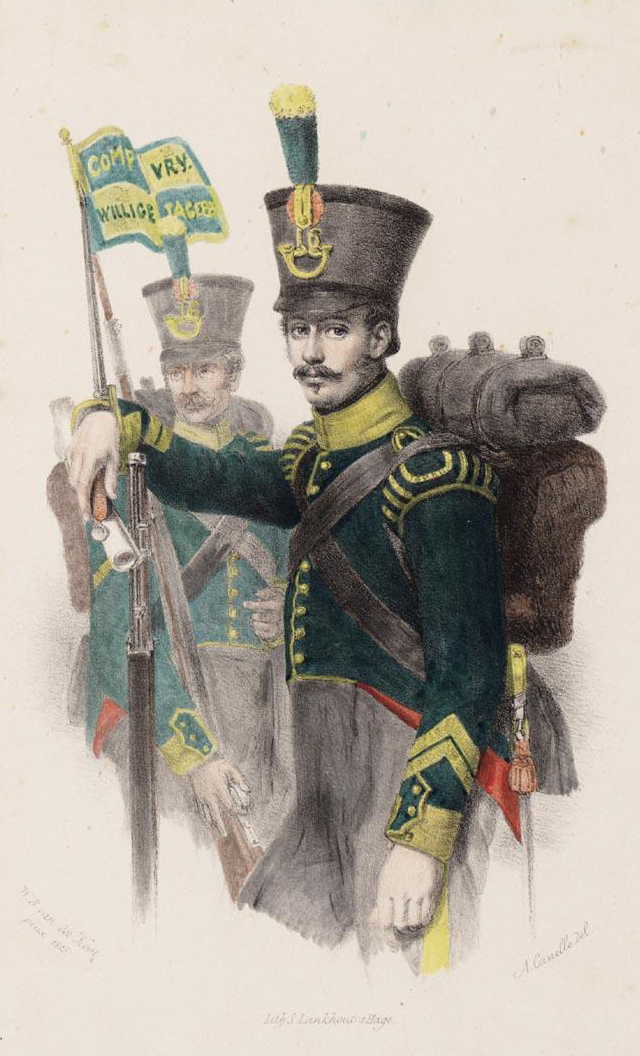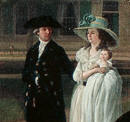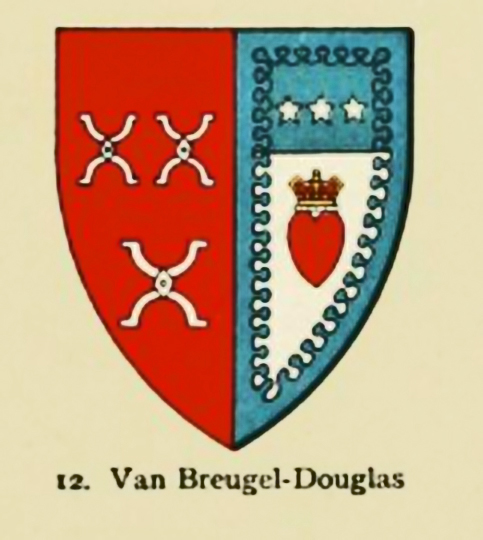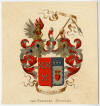Baron Caspar Breugel Douglas
 |
Portrait of Jhr. R. Baron van Breugel Douglas (Caspar's
father), Corporal
of Volunteer Jagers Company, BJ16, coloured lithograph from
1866. This company consisted of students from the University
of Franeker. Note the yellow piping on the trousers.
In the background is a fourier with the company's flag
shown, the flag is preserved in the Fries Museum in
Leeuwarden (Note: the text on the reverse PRO - VINCIE -
VRIES - LAND). |
 |
Mr. Caspar van Breugel and Mary Douglas, the ancestors of
Robert Baron van Breugel Douglas.
from the Oil Painting
"The Rey's Court" by J. Fri Must, 1787. (n the district
Reeshof in Tilburg.)
In the middle is Jan van Breugel the
Rovere Rustenhoven who next to his mother Eva Maria Burman.
On the horse (See enlarged image) is retired army captain Charles Rey
de Carle, second husband of Eva Maria Burman.
Coll. Dr..
Francisco Tudela van Breugel Douglas, Lima, Peru . |
Baron Caspar Breugel Douglas, diplomat (Born Vevey (Switzerland)
01.05.1896 - Died Cannes (France) 10/08/1982) was the son of Robert Baron van Breugel Douglas
(1864-1924) and Vera Vassilievna Khlebnikoff.
He was a 3x great-grandson of General Robert Douglas.
Caspar married 08/07/1928
Aga Ioana Maria Berendei. From this marriage a daughter was born.
Baron van Breugel Douglas became the first Netherlands Ambassador
accredited to the Soviet Union.
Casper van Breugel Douglas, son of a Brabant family rains in
1815 was elevated to the peerage, in The Hague attended the
five-year high school and was, after obtaining the diploma, an
appointment at the Department of Foreign Affairs. He explained in
the July 1921 exam for embassy attaché, and was living then, as one
of the secretaries of the Dutch delegation, the fleet conference in
Washington (1921/1922) at. Then he worked in the embassies in
Brussels (1922/1923) and Constantinople (1923). In November 1923,
Van Breugel Douglas promoted to the embassy secretary, in which rank
he subsequently worked for the Dutch representatives in Rio de
Janeiro (1923-1926), Bucharest (1927/1928) - where he married the
daughter of a Romanian hofdignitaris - , Berlin (1928/1929),
Copenhagen (1929/1930), Ankara (1930-1932) and Washington
(1933-1937). On the last post he worked since February 1934 with the
rank of embassy council. In May 1937 he was appointed envoy
extraordinary and minister plenipotentiary in Athens.
Van
Breugel Douglas's career was well established in the usual way: his
promotions came after the required number of years, albeit with some
delay, position. He showed a typical representative of the
aristocratic mentality in the prewar years in the Dutch diplomatic
service prevailed. Himself he made the comment once that tact, sense
of duty and intellectual preparedness requirements were for the good
functioning of the corps. His eyes were those with an aristocratic
background, therefore, best suited for this. Just such ideas in his
career would lead to clashes with diplomatic personnel of a lower
origin. Coincidentally, Van Breugel Douglas has emerged as a fairly
headstrong person. The ambassador stayed and made love in high
society, not without pride, reported he has received a number of
officers and knights cross.
After the German occupation of
Greece in April 1941 was Van Breugel Douglas left the post in
Athens. In late December he was sent to China, because at that time
the only immediately available to the diplomatic post. A major
drawback was that his knowledge of the problems of the Dutch-Chinese
relations was minimal. Therefore he followed, in transit to its new
destination, a crash course in Batavia mainly his knowledge of the
problems arising from the presence of a large number of Chinese in
the Dutch East Indies was complete. Given the political divisions
which China in those years had fallen prey, Douglas, Van Breugel
carefully instructed them to prepare a few visits to the occupied by
the Japanese cities of Shanghai and Beijing. He also had unofficial
contacts with the Japanese puppet regime created under the
leadership of Wang Ching-wei at Nanking. But primarily served the
envoy to focus on the relationship with the Nationalist government
under Chiang Kai-shek in Tsjoen King.
Before Van Breugel
Douglas himself very well in Chongqing had established, was an
important part of his service has already overtaken by events. With
the capitulation of the Dutch East Indies, in March 1942,
disappeared in the interest of the Nationalists could have relations
with the Netherlands. For Chiang Kai-shek and his followers had no
point, through Van Breugel Douglas, the Dutch government to knock on
military cooperation, deliveries of goods and credit. For the envoy
was little differently than most of his time to fill with - not
uninteresting - observations. Even further, the embassy in China for
post-Van Breugel Douglas anything but a pleasure. Living conditions
in Chongqing were different than he was used, really bad. The regime
of Chiang Kai-shek was in the eyes of the ambassador a little
uplifting impression: the Kuo-min-tang was a government of
corruption permeated regime.
As chef de poste said Douglas
Van Breugel the reports together, taking until the end of 1942
assisted by embassy secretary and interpreter H. Bos. The latter is
undoubtedly strong mark on the content of the news, since he alone
of the Dutch embassy and the Chinese language mastered after years
of residence there was a good insight into the politics of this
country. A conflict between Van Breugel Douglas and he was therefore
inevitable. Also affiliated with the Dutch embassy military
representative, L.Ph. Taming of, came into serious collision.
On November 12, 1942 it was decided Van Breugel Douglas as
extraordinary and plenipotentiary ambassador to the Soviet Union to
send. On July 10, 1942, the Dutch government in London signed an
agreement with the USSR concerning recognition and the establishment
of diplomatic relations. It was not easy for the post in Moscow a
suitable candidate. In November, however, the thoughts went out to
Van Breugel Douglas. They did not deem it wise to keep him longer in
Chongqing. The ambassador in Moscow, he had at least the advantage
that his mother came from Russia. Moreover hoped Minister of Foreign
Affairs and Van Breugel Douglas Kleffens that the situation in the
Soviet Union with a "bias would consider more than a righteous Dutch
... seems inevitable. Whether the Cabinet should however just did
Van Breugel Douglas in Moscow to name the question. Immediately
proved himself little happy feeling with his new position.
Especially the personal and temporary nature of the title conferred
on him ambassador put Van Breugel Douglas strongly. He feared this
an incredible impression on the Russians.
Due to various
logistical problems, Van Breugel Douglas until September 1943 in the
Soviet Union. Once installed in Moscow, the ambassador put his
displeasure not to hide. He considered his staff is too small and
complained that the Dutch Embassy was housed in several rooms in the
Russian capital. The housing problem was only resolved in 1945. The
ambassador ruled not positive about the Soviet Union and its
inhabitants. In his reports he mentioned "this primitive people,"
"apostles of Communism" and especially of their "simplistic
feelings.
Since obtaining information and establishing
personal contacts with the Soviet authorities bureaucratic set
almost impossible, Western embassies were heavily dependent on each
other to obtain and gather information about the USSR. Van Breugel
Douglas also visited Moscow regularly foreign colleagues. His
personal contacts with British and American diplomats were well,
making it through them, sometimes with great tenacity, Dutch
interests in the Russian government could emerge. This was
particularly true for repatriation issue. During the war, many Dutch
people, through the Arbeitseinsatz, involuntarily transported to
Eastern Europe. Van Breugel Douglas was ordered to take an
arrangement with Moscow in order to expedite their return to the
Netherlands. Since the Soviet government, however, all Russian,
Polish or German territory found Dutch regarded as accomplices of
Germany, his efforts had little success. After the war he was
therefore insufficient to blame for the returnees having intently,
an accusation that also in 1952 by the Committee of Inquiry into
government policy 1940-1945 was considered unfounded.
In June
1946, Ambassador Van Breugel Douglas recalled and with effect from 1
October officially laid off due to alleged "improper financial
transactions, comprising the 'introduction of illegally obtained
rubles" and "trading with by him under diplomatic immunity imported
goods "(Annex Senate 1950-1951). The charges against him originated
in a report published in June 1946 the Court of Audit. A hastily set
by the minister official inquiry in 1947 was the Court's findings in
writing. On April 16, 1948 it was decided Van Breugel Douglas
honorable, but not at his own request to dismiss.
Van Breugel
Douglas wished not to acquiesce in this graceful little abrupt and
end of his career. He tried to undo the dismissal by the First
Parliamentary Committee for the applications in turn. In April 1951,
this committee concluded that there are insufficient grounds for
dismissal had been. The debt was too one-sided at the ambassador
laid. In all, the whole affair a few years drag on and never quite
satisfactory for the ex-ambassador to be resolved. After his
resignation as ambassador Van Breugel Douglas lived mostly abroad,
most recently in Cannes, where he died at the age of 86
A:
Details of the affair, Van Breugel Douglas in the collection of the
collection Bylandt 1940-1945 and 1942-1946 Douglas Van Breugel, both
held by the Ministry of Foreign Affairs in The Hague.
L:
Appendices to the report of the proceedings of the Senate of the
States General 1950-1951, No. 80, ibid 1951-1952, No. 18, Report
containing the results of the study [of] Committee of Inquiry into
Government Policy 1940-1945 VIa / b (The Hague, 1952) 493-512; AE
Kersten, Foreign Affairs in exile 1940-1945. Institutional aspects
of foreign policy gained momentum (Alphen aan den Rijn, 1981); F.
Dankers, Netherlands and China, 1940-1950. The highlights of the
Dutch policy towards China in continuity and change [Unpublished
doctoral thesis Div. History University of Nijmegen] (Nijmegen,
1982), MAP van den Berg, "The repatriantenkwestie 1945. The return
of Dutch from the Soviet Union ', in The Low Countries and the
Soviet Union. Imaging and relationships. Under edited by ML Roholl
[et al] (Amsterdam, 1989) 11-27 GT White, A distant enemy is
approaching. The diplomatic relations between the Netherlands and
the Soviet Union, 1942-1953 (Kampen, 1990).
Original version
included in: Biographical Dictionary of The Netherlands 4 (The Hague
1994)
Could you help improve it?
 |
Arms
of van Breugel Douglas. — Per pale, Dexter, van Breugel as in plate.
Sinister, Douglas of Friarshaw.
CRESTS : Dexter, On a coronet a
sitting hound proper, gorged with a coronet or, between two
wings, one argent and the other
gules ; Sinister, Douglas, as
before.
MOTTOES : Above the Douglas Crest, "Do or die," and
beneath the shield, " In trinitate fortitudo " ( Wapenboek van
den Nederlandschen Adel" by J. B. Rietstap). |
 |
See also:
Francisco Tudela van Breugel Douglas
Any contributions - and a better
translation - will be
gratefully accepted
Errors and Omissions
|
|
The Forum
|
|
What's new?
|
|
We are looking for your help to improve the accuracy of The Douglas
Archives.
If you spot errors, or omissions, then
please do let us know
Contributions
Many articles are stubs which would benefit from re-writing.
Can you help?
Copyright
You are not authorized to add this page or any images from this page
to Ancestry.com (or its subsidiaries) or other fee-paying sites
without our express permission and then, if given, only by including
our copyright and a URL link to the web site.
|
|
If you have met a brick wall
with your research, then posting a notice in the Douglas Archives
Forum may be the answer. Or, it may help you find the answer!
You may also be able to help others answer their queries.
Visit the
Douglas Archives Forum.
2 Minute Survey
To provide feedback on the website, please take a couple of
minutes to complete our
survey.
|
|
We try to keep everyone up to date with new entries, via our
What's New section on the
home page.
We also use
the Community
Network to keep researchers abreast of developments in the
Douglas Archives.
Help with costs
Maintaining the three sections of the site has its costs. Any
contribution the defray them is very welcome
Donate
Newsletter
If you would like to receive a very occasional newsletter -
Sign up!
Temporarily withdrawn.
|
|
|
|
|
|
|
|


